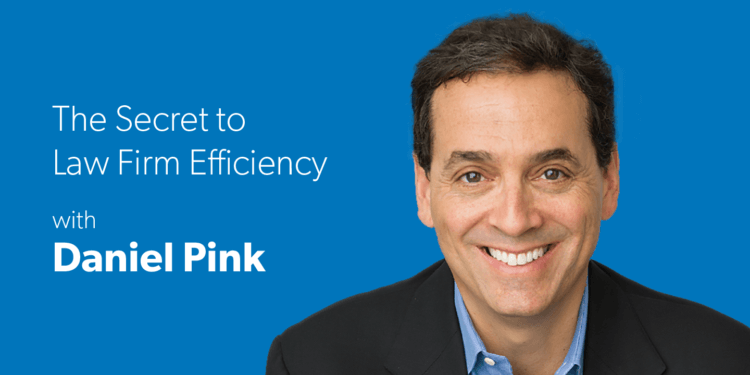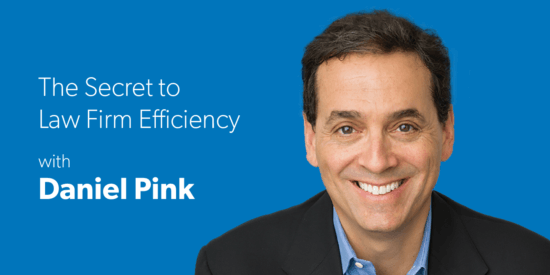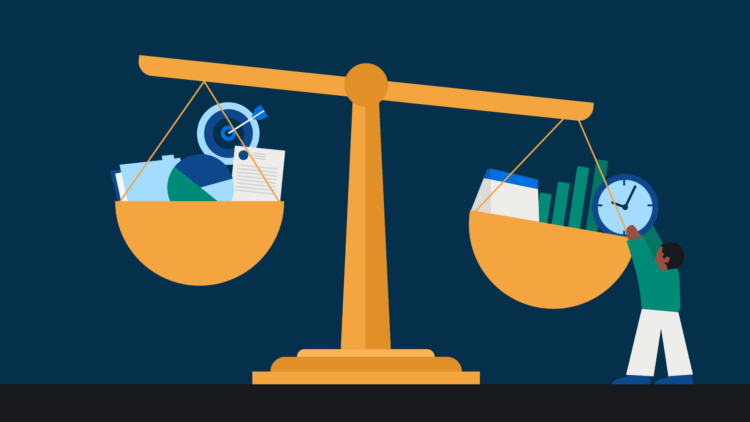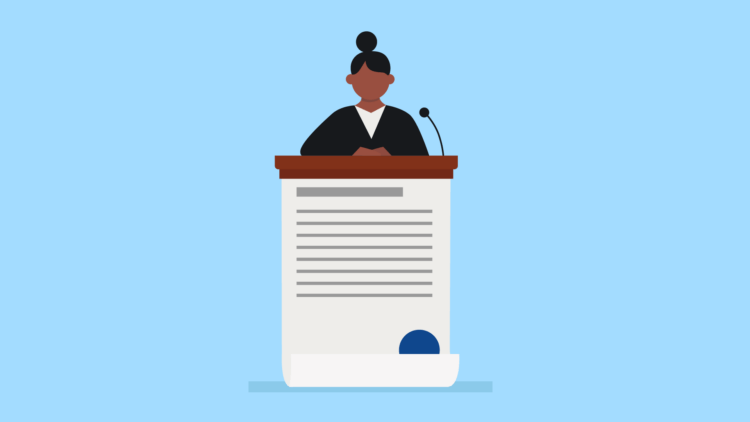The Secret to Law Firm Efficiency
If you’re searching for the secret to law firm efficiency, bestselling author Daniel Pink might just have the answers you’re looking for. In his latest book, When: The Scientific Secrets of Perfect Timing, Daniel delves into psychology, biology, and economics to provide insight into how we can make better decisions about when we do things.
I spoke with Daniel at the 2019 Clio Cloud Conference, where he shared insights into his research for the book, as well as what his findings mean for lawyers specifically.
Teresa Matich:
What inspired you to investigate the secrets of perfect timing?
Daniel Pink:
It was really frustration more than anything else—or maybe a mix of frustration and curiosity. I found myself making all kinds of timing decisions, but I was making them in a very sloppy way. I wanted to make them in a much more evidence-based way. I looked around for guidance, but couldn’t find any. Then, out of curiosity, I started looking at some of the science. I was blown away by how much research there was and how many different fields had explored this topic. I felt that if I did the work and went through literally two-dozen different disciplines and hundreds upon hundreds of studies, I could piece it all together and could come up with a way to make better decisions about when to do stuff.
Teresa Matich:
Absolutely, and something that comes up for everybody is that there’s never enough time, no matter what. What do you think is the biggest misconception that people have about timing after all your research on this?
Daniel Pink:
Well, some of it depends on what we mean by timing. Sometimes when we talk about timing, we’re talking about fate, circumstance, or luck. That’s not what I’m talking about. I’m talking about when you do things, and not only when you do stuff within a day, but also other questions. How do beginnings affect us? How do midpoints affect us? How do endings affect us? How do groups synchronize in time? How does the very way we think about time shape our behavior? If we go back to this unit of “the day,” I think the biggest misconception is that I don’t think we fully realize how much our brainpower changes over the course of the day.
Our brainpower does not remain constant over the course of a day. Now, we have an intuitive sense of that I think, but this is one case where intuition is supported by science. But we don’t do anything about it. The premise in how we organize our work is that, “Hey, I could have a meeting at 10 o’clock, I could have a meeting at three o’clock, I could write this brief at 11:30, I could write this brief at 2:30,” and that’s wrong. There are material differences in our performance based on time of the day. And if you know that, you can actually begin to reconfigure your schedule and your workload to take that into account.
Teresa Matich:
Yeah. You talk about slumps and sparks in the book, and how your mind changes throughout the day.
Daniel Pink:
What we know is that we tend to move through the day in these three stages: a peak, a trough, and a recovery. We perform very differently in each of those different periods.
Teresa Matich:
Okay. So, this point really intrigued me because I’m curious what your advice is for lawyers who are in the middle of a long trial and they maybe don’t have a ton of choice over how they’re structuring their day: What advice would you give to them?
Daniel Pink:
That’s a really important point. At some level you have to be even more intentional and deliberate in those kinds of circumstances than if you do have that full control. So there are a couple of factors here.
There’s some evidence showing that juries make different decisions when they deliberate at different times of day. That is, they render different verdicts based on time of day. So, if you want to send your jurors out, you might want to actually look for ways to end the trial at a time where they’re deliberating at a time that they’re a bit likely to make. You don’t have huge control over this, of course, but you might be able to up your percentages a little bit.
Also, remember that what we know most people move through the day in this order: peak, trough, recovery. Peak early, trough in the middle of the day, and then recovery later in the day. But that’s not true of everyone. The people who don’t follow that pattern are people who have what are called evening chronotypes—they’re night owls. I think it’s going to be very hard to be a lawyer who’s a night owl, because most trials are scheduled during conventional business hours. At the same time, we know there are big decrements in performance for non-owls in the early to mid afternoon. So what do you do? If I’m an evening chronotype lawyer who has to try a case during the day, I would do a couple of things. Number one is I would be meticulous about planning, even more meticulous than a typical trial lawyer. In fact, when I’m at my peak of vigilance late in the day, I might even even create a checklist of everything that I need to do and say during that day-long trial. The other thing that I would do is also, if possible, if you have a co-counsel, have a co-counsel who’s not an owl, so you have someone who’s at her peak of vigilance early in the day.
I would also be much more deliberate about breaks. During the early-to-mid-afternoon trough we underperform, and one remedy for that is taking more breaks and certain kinds of breaks. Maybe you can ask the judge for a recess, a short recess, and use that recess to take a walk outside. We actually know a lot about the types of breaks that are most effective. Breaks with other people. Breaks outside rather than inside. Breaks when we’re in motion rather than when we’re sedentary. Breaks when we’re fully detached. It’s also going to be helpful for the jurors, especially in any kind of complicated trial where jurors have to follow a chain of logic or the jurors have to follow a complex set of facts.
Teresa Matich:
Yeah, that’s a lot of really helpful, tactical stuff. I want to come back to something that you said, which was pairing up different types of chronotypes. You’re suggesting that, hopefully, this language would become mainstream and that people would start to plan their businesses around that and their schedules, and that they would reap the benefits of perfect timing in collaboration—not just by choosing when they do their own tasks throughout the day.
Daniel Pink:
That’s a great point. Let’s take two steps back and talk about collaboration. One of the things we know about collaboration—one of the things we know about effective groups of any kind—is that groups make better decisions and come up with more and better ideas when there’s some diversity in the group. Having somebody who is an owl and having somebody who’s a lark is itself a form of cognitive diversity. If you’re going to make decisions, you want people who are looking at things differently, seeing things differently. Because the peaks and troughs and recoveries of each of those chronotypes is different, you’re going to have actually a different frame of mind and a different way of thinking applied to the problem if you have chronotype diversity.
Teresa Matich:
Absolutely. So there are a lot of solo lawyers in the US. What advice do you have for them for synching with other people or getting the benefits of synching with other people? Maybe in other ways so that they can be more successful?
Daniel Pink:
That can be difficult. The other factor here is if you’re working on a billable hour. There are so many arguments against the billable hour, but the timing stuff is just yet another one. For example, my peak is in the morning. That’s when I am most vigilant. The truth is, if I had a client, my time between say 9:30 and 10:30 is far more valuable time than my time between 2:30 and 3:30, and yet we’re billing the same amount for it.
If you’re an individual lawyer, here’s one thing: You often have more control over your schedule. What you have to do is you have to just take the when of the work as a factor in doing your work. Lawyers tend to be very deliberate about what we do. We’re fairly deliberate at least about who we do it with. Lawyers choose their clients, they choose their colleagues, they hire people to work in their firms. But they’re not deliberate about when they do stuff. You should also be more deliberate about the when. You can do that by observing your own behavior. What’s it like having this meeting at this time of day? What’s it like having this meeting at that time of day? Learn from that, and you’ll do a little bit better.
Teresa Matich:
Yeah, and that’s so important because we know Clio puts out the Legal Trends Report every year, and we found that most lawyers are only billing about 29% of billable work during their day. It goes down in terms of collection, utilization, and when we ask what they’re spending time—
Daniel Pink:
Really? 29%?
Teresa Matich:
Yes, it’s very low, and there’s a lot of time spent on administrative work, on business development, all that sort of stuff.
Daniel Pink:
Yes.
Teresa Matich:
You gave so many tactical tips before, I want to ask you what you would say to the small firms who—throughout the course of the day—they’re meeting with clients, they’re emailing, they’re billing, they’re thinking of new ways to do business development. When should they schedule all these things?
Daniel Pink:
Let’s go back to our three-part day. Peak, trough, recovery. During the peak, people should be doing their analytic work, their heads-down work. Again, for most of us that peak is early in the day, but for owls it’s later in the day. In the legal profession, that would be things like writing a brief, doing legal research, or other tasks where you have to be locked down and focused.
The billing and administrative stuff, do that during that trough period early to mid-afternoon. It doesn’t require a lot of brain power. It doesn’t require that much attention. Just get rid of that administrative stuff when you’re at your worst.
Then the recovery period is interesting for 80% of us, because we’re less vigilant, but we’re in a pretty good mood. That makes it good for things like brainstorming—new strategies or new approaches to business development, and so on. If you can make small adjustments over the course of the day to do the right work at the right time, the evidence is pretty overwhelming you’re going to see improvements in performance.
Teresa Matich:
Absolutely, I’m not sure whether this happens or not, but if you meet anyone who doesn’t believe that planning your day out like this is worth the investment, what do you tell them to convince them otherwise? What sort of scientific studies do you most often point people to?
Daniel Pink:
I don’t know if there’s a single knockout study that shows this, but at some level, I’m litigating this argument, right? I’m making the case? If it were a criminal trial, I really think I’d be beyond a reasonable doubt. If it’s a civil trial, they should’ve settled already — because it’s so beyond the preponderance of evidence that anybody who’s opposing me in this litigation was a fool not to settle two weeks ago.
Teresa Matich:
Okay. And if you had 30 seconds to sell a lawyer specifically on the importance of timing, what would you tell them?
Daniel Pink:
I would tell them that when you do stuff has a material effect on your performance. If you care about being an effective lawyer, pay attention to the when of your work.
Teresa Matich:
That makes a lot of sense. Thank you so much for joining me today, Daniel.
Daniel Pink:
Thanks for having me.
About Daniel Pink
Daniel H. Pink is the author of six provocative books about business and human behavior. His books include the long-running New York Times bestsellers When and A Whole New Mind—as well as the #1 New York Times bestsellers Drive and To Sell is Human. Dan’s books have won multiple awards, have been translated into 40 languages, and have sold more than three million copies. He lives in Washington, DC, with his family.
We published this blog post in July 2020. Last updated: .
Categorized in: Business









